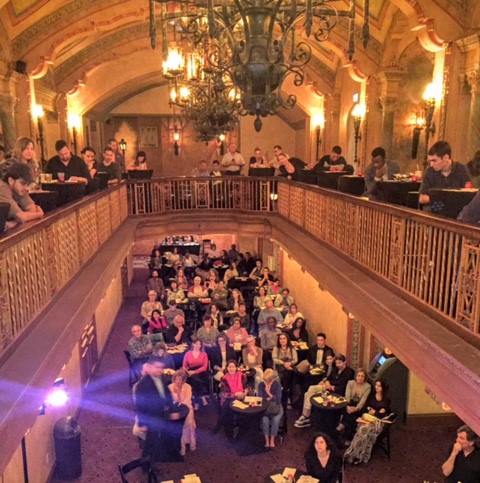DASS's curator, author Raul Guerrero, says this is exactly the kind of "intellectual flirting" its members enjoy every month. Drawing on the concept of the salon, which flourished during the European Enlightenment and enjoyed a heyday during the Parisian jazz age of Fitzgerald and Gertrude Stein, DASS functions as a local social club that discusses themes ranging from science and innovation to literature and music.
This Wednesday offering produced a conversation among many different art forms: literature, drama, music, and architecture, housed under the Olympia's gilded dome.
Coincidentally–or perhaps not–each of the four authors chose a passage that focused on the nature of father-daughter relationships. Pairing literature with jazz–especially stories like these, turbulent re-tellings of traumatic experiences–was a natural fit. Gary Thomas and his quartet produced melodies that could please a discerning jazz lover, while setting up a dialogue with each story.
Kicking off the evening, Chantel Acevedo read from her latest novel, The Distant Marvels. A Cuban-American author who recently returned to her native Miami as a professor in the University of Miami's English department, Acevedo chose to read the excerpt herself. Acevedo's selection looked at the protagonist's complicated relationship with her bullish father, a devout follower of Jose Martí in his fight to liberate Cuba from Spanish rule.
Stacy Conde's The Red Speck followed. The author opted for a dramatic reading by actor Terrell Fritz, whose magnetic boom and startling tenor served her story well. Driving along on a bleakly rainy evening, father and daughter mentally spar, their secret musings heard only in their own heads - and by the audience. His anger, at first seeming to be meant for a foolish wife, unraveled before the audience: it was his daughter he had called “a cunt,” and not the gold-digging woman he refused to divorce.
Between Conde and Acevedo, viewers got a real sense of the difference between a reading and a dramatic interpretation, and how they affect the way a work is consumed. The audience was abuzz with chatter between the readings, discussing what they’d just heard.
Understanding how persona and prose play off one another, novelist J.J. Colagrande produced a kind of virtual reality. His geeky schoolboy demeanor led the audience through a sort of video game, the protagonist cycling through the stages of teenage angst, as he read from his work-in-progress, a coming-of-age story called Reduce Heat and Continue to Boil.
After an actor's reading of Vanessa Garcia's White Light, a story loosely based on the writer's own struggle with losing her father during an important moment of her career, the quartet strummed its final tune.
Exploring the velvety halls of Miami's oldest theater, patrons lingered for an hour longer. Some stayed for the cocktails, others for the conversation, the sound of literature buzzing in their ears.
—Nicole Martinez


 RSS Feed
RSS Feed